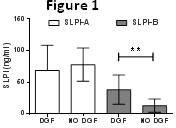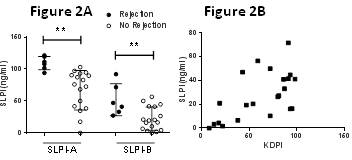SLPI in the Perfusion Liquid: A Predictor Marker of Short and Long Term Clinical Outcomes.
1Instituto de Nefrología, Caba, Argentina
2CEFYBO-UBA, Caba, Argentina
3Fundación GADOR, Caba, Argentina.
Meeting: 2016 American Transplant Congress
Abstract number: 498
Keywords: Donors, Ischemia, Kidney transplantation, marginal, Preservation solutions
Session Information
Session Name: Concurrent Session: Ischemia Reperfusion Injury: Clinical Innovation
Session Type: Concurrent Session
Date: Tuesday, June 14, 2016
Session Time: 4:30pm-6:00pm
 Presentation Time: 4:54pm-5:06pm
Presentation Time: 4:54pm-5:06pm
Location: Room 311
A lot of efforts have been done to identify the risk factors that tend to diminish the incidence of delayed graft function (DGF). Recently, the secretory leukocyte peptidase inhibitor (SLPI) was proposed as a biomarker candidate for acute kidney injury (AKI), since high level of it was found in plasma and urine of patients. The aim of the present work was to determine if the level of SLPI in the cold preservation solution could be a useful marker to predict early and late kidney function after transplantation.
Twenty three patients were enrolled. Kidneys were perfused with 1 liter of Wisconsin solution before the transplantation. The SLPI concentration was measured on two fractions of the perfused solution, i.e. the first 50 ml (SLPI-A) and the last 50 ml (SLPI-B). Direct correlations were found between SLPI-B and DGF risk factors (donor age, p=0.013; pre-ablation plasma creatinine values, p=0.047; cold ischemia time, p=0.01). Furthermore, the patients with DGF had statistically significant higher SLPI-B values compared with patients without DGF (Figure 1).
Also, we found an indirect correlation between SLPI-B and MDRD measured at patient discharge. Interestingly, patients (6) that suffered rejections during the first 6 months after transplantation, had higher values of SLPI-A and SLPI-B than patients without rejections.
Remarkably, we find a direct association between KDPI (a score that evaluate the quality of deceased-donor kidneys) and SLPI-B (r=0.55; p<0.005) (Figure 2B).
These results suggest that SLPI concentration in the perfusion liquid could be a good predictor marker for short and long term clinical outcomes in kidney transplantation.
CITATION INFORMATION: Dotta A, Caro F, Peña Ponce K, Ambrosi N, Salaberry J, García X, Minué E, León L, Sánchez F, Togniolo F, Incardona C, Chuluyan E, Casadei D. SLPI in the Perfusion Liquid: A Predictor Marker of Short and Long Term Clinical Outcomes. Am J Transplant. 2016;16 (suppl 3).
To cite this abstract in AMA style:
Dotta A, Caro F, Ponce KPeña, Ambrosi N, Salaberry J, García X, Minué E, León L, Sánchez F, Togniolo F, Incardona C, Chuluyan E, Casadei D. SLPI in the Perfusion Liquid: A Predictor Marker of Short and Long Term Clinical Outcomes. [abstract]. Am J Transplant. 2016; 16 (suppl 3). https://atcmeetingabstracts.com/abstract/slpi-in-the-perfusion-liquid-a-predictor-marker-of-short-and-long-term-clinical-outcomes/. Accessed July 18, 2025.« Back to 2016 American Transplant Congress
